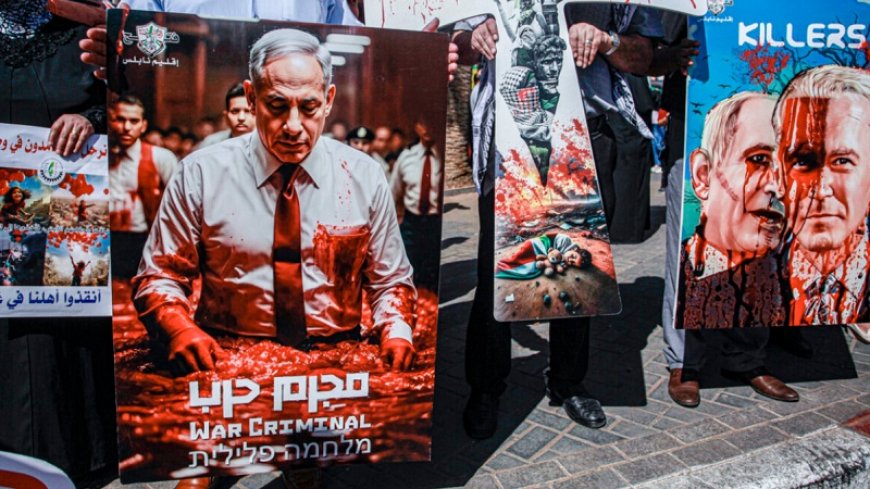The OIC will warn about the Israeli attacks in the Rafah area
The talks in Cairo to discuss the issue of Israeli and Palestinian hostages with the aim of reaching an agreement to cease fighting in the Gaza war have ended without any results.

The talks in Cairo about the war in Gaza were attended by representatives of the United States, Egypt, Qatar, Hamas and the Zionist regime. William Burns, Head of the American Intelligence Agency CIA, Muhammad bin Abdulrahman Al Thani, Prime Minister of Qatar and Egyptian officials met in the country's capital Cairo to discuss the ceasefire. David Barnea, Head of Israel's Mossad Intelligence Agency, and Ronen Barr, Director of Shin Bet, the internal security organization of the Zionist regime, also attended the Cairo talks on behalf of the regime. From right: Muhammad bin Abdulrahman Al Thani, David Barnea and William Burns Although the Cairo talks ended without an agreement being reached, it is said that they will be resumed in the future. A Zionist official has explained in an interview with the American news network Axios that the only step taken in the negotiations is to understand the gaps that need to be closed, in order to enter the next negotiations to find an agreement to end the war. There are several reasons that led to the Cairo talks ending without reaching an agreement. One of the reasons is related to the length of the ceasefire. The American newspaper Wall Street Journal has quoted some circles and announced that the Hamas movement and the Zionist regime differ on the issue of the ceasefire.
Hamas emphasizes the implementation of a permanent cease-fire, but the Zionist regime wants the cease-fire to be temporary; and the reason is that you want the fighting to stop in order to facilitate only one thing, which is the release of the Zionist hostages; and Hamas understands that, once the hostages are released, the Zionist regime will restart the war against Gaza. Another issue that raised differences concerns the number of Palestinian hostages that both sides, Hamas and Israel, want to be released. In relation to the issue, the Axios website has written that the biggest obstacle that hindered the talks in Cairo is the number of hostages that Hamas has wanted to be released but Tel Aviv has opposed, and the issue has led to the breakdown of the talks. Another important reason is related to the differences within the Israeli cabinet. Within the Zionist council, no consensus was reached on the issue of negotiating with Hamas. While some members of the cabinet admit that Israel has lost the war in Gaza, Netanyahu still insists on continuing the war. In this regard, Israeli television has reported that the Mossad, in collaboration with the Shin Bet and the Army, proposed a new ceasefire agreement for the release of Israeli hostages, but the proposal has been rejected by Netanyahu. There are even some circles that have announced that, under the pressure of the American government, Netanyahu has sent another Israeli delegation to Cairo. Available reports indicate that the talks will resume in the coming days; but even if they happen, they will be able to be productive and find a suitable end only when Netanyahu reaches the conclusion that, on the one hand, continuing the war is not supported by Western countries and especially the United States; and on the other hand, continuing the war against Gaza will cost Tel Aviv dearly internationally.
The Organization of Islamic Cooperation (OIC) has condemned the ongoing attacks carried out by the Israeli army against the people of the Gaza Strip and the expansion of the regime's arbitrary attacks on the city of Rafah, in the south of the strip. The Organization of Islamic Cooperation has said in its statement that "Israeli attacks in Rafah have killed a martyr and injured hundreds of Palestinians, most of them children and women, as a sign that the illegal regime has underestimated and ignored the international warning of the negative consequences of attacking the city which has sheltered more than 1.5 million Palestinians and suffers from a lack of basic human needs." The OIC has warned of "the danger of an extension and escalation of Israeli attacks, which is a continuation of the genocide, increasing human suffering in the Gaza Strip, and an unacceptable attempt to forcefully expel the Palestinian people from their land." The nation of the largest community after the United Nations has said, what is being done by Israel in Gaza "is a clear deviation of the decision of the International Court of Justice (ICJ), which asked Israel to take immediate measures to prevent all the acts contained in the article II of the Convention on the Prevention and Punishment of Genocide. Mass grave of civilians killed by Israel, Gaza The organization also condemned the attacks, sabotage and organized terrorism that continue to be carried out by groups of radical Jewish settlers in collaboration with the soldiers of the Israeli regime against Palestinian citizens, their land, property and their holy places in the occupied West Bank. including East Quds. The OIC has reiterated its call to the international community, especially the United Nations Security Council, to fulfill its responsibilities regarding the need to fully stop Israel's attacks and ensure that humanitarian aid is delivered to the people of Gaza without any conditions.













































